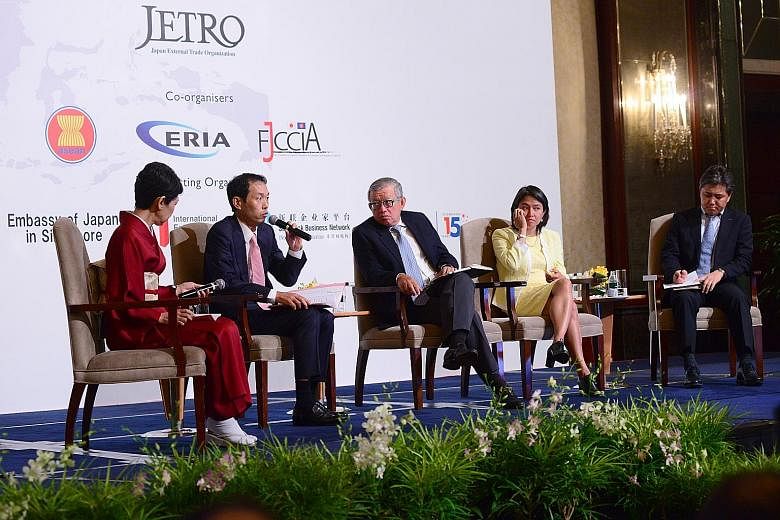Japan's private sector has an important role to play in developing economic integration in the region, Asean Secretary-General Le Luong Minh said yesterday.
As well as foreign direct investment and Japanese firms' ties to South-east Asian businesses, Mr Minh noted public-private partnerships could boost connectivity by building physical infrastructure.
A closer, more connected Asean was the hot topic at a free-trade symposium marking the bloc's 50th year and the 10th anniversary of founding talks for the Federation of Japanese Chambers of Commerce in Asean.
Mr Hiroyuki Ishige, chairman and chief executive of the Japanese government-linked Japan External Trade Organisation (Jetro), told the more than 300 people at the event that Britain's vote to leave the European Union and the American withdrawal from the Trans-Pacific Partnership (TPP) means "Asean and Japan have to play a leading role in promoting the importance of free and fair trade". These include TPP alternatives such as the TPP-11 or the Regional Comprehensive Economic Partnership (RCEP).
Mr Minh welcomed ongoing RCEP negotiations, calling the potential deal "a model for inclusive and innovation-oriented growth, which facilitates the participation of micro, small and medium-sized enterprises and local enterprises into the regional value chains".
Singapore Business Federation chief executive Ho Meng Kit said in a panel discussion: "For Asean to become a global hub for wider economic collaboration, it is important that Asean presses forward and makes further progress in stronger integration."
He hailed the evolution in Singapore-Japan economic partnerships, with the Republic going from being a manufacturing base for Japanese companies to an investment partner in other countries in the region.
But Ms Hanim Hamzah, regional managing partner at Zico Law Network, pointed to visa requirements and regulations on incorporating new companies as remaining challenges. "The disparity in terms of ease of doing business is still there," she noted.
More uniformity in corporate regulations - such as intellectual property laws - could also boost Asean's lustre as a global supply-chain hub, said Federation of Japanese Chambers of Commerce and Industry in Asean chairman Takuhiko Tochiori.
Meanwhile, Mr Ho called on companies to keep the environment, workers' skills training and local small businesses in mind when setting up shop. "These are the kinds of actions... Japanese and all other investors in Asean need to do." He added that in working towards economic integration, "each Asean member-state must recognise their own relative strength", whether it be Singapore's finance sector or commodity-rich Indonesia's natural resources.
Annabeth Leow


